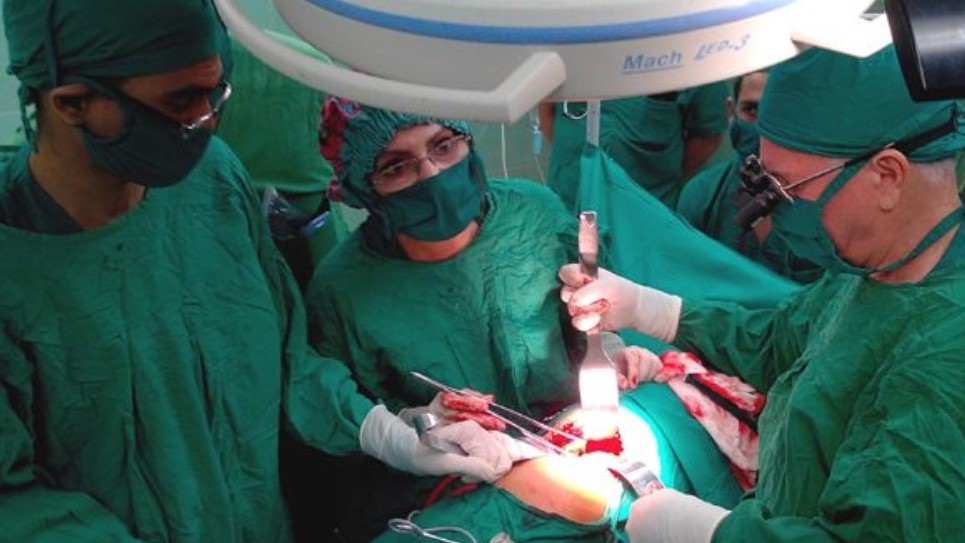Cuba has suffered a setback in numerous spheres in recent years as a result of a chronic socio-economic crisis, exacerbated by failed policies. Public Health has been one of the systems most affected, within which organ transplants have suffered a clear regression. A decade ago the case of Amanda Lemus Ortiz never would have received the media attention is getting today. The little girl's life is on the line as she waits for a liver transplant, and her parents are demanding a solution from the authorities.
Before 1959 Cuba was one of the most medically advanced countries in Latin America. Health-related advances in the country include the application of ether anesthesia, in 1847; and the first X-ray department in Latin America, in 1907. In 1955 it was the Latin American country with the second-lowest infant mortality rate: 33.4 per thousand births.
The first bone grafts in Cuba were carried out in the 1940s, when the island was a pioneer in the creation of tissue banks.
In 1970, the first successful kidney transplant was performed, on a 16-year-old. Nine years later, in 1979, related and compatible living-donor transplantation was introduced. The first heart transplant dates back to 1985, considered a breakthrough for a Third-World country.
The first liver transplant in Cuba was performed in 1986; in children, it took a little longer: 2005, and in 2009 the William Soler University Pediatric Hospital in Havana was the site of the first liver transplant from a living donor to a child.
Between 2014 and 2019 102 liver transplants were performed in Cuba at the only three hospitals dedicated to this procedure (only one pediatric) and integrated into the National Transplant Program. In 2019 there were only nine of these operations.
A year later the Covid-19 pandemic stopped operating rooms cold. The Public Health system collapsed, while the Government allocated resources, including raw materials for other medicines, to produce not one, but five vaccine candidates.
In late 2023, at the meetings prior to the sessions of the National Assembly of Popular Power, Public Health Minister José Ángel Portal Miranda Health admitted that the Government had serious problems supplying the sector.
The regime's inability to guarantee medical treatments and surgical procedures, while allocating millions in investments to the construction of hotels, still not fully occupied, threatens the lives of children like Amanda Lemus Ortiz.
The girl suffers from biliary duct atresia. She now needs a liver transplant that will allow her to overcome her terrible state of health and live. Although her father is willing to be the donor, the William Soler Hospital lacks the resources to carry out the operation, and refuses to receive supplies delivered by third parties, according to relatives.
The MINSAP recently went into damage control mode in response to media coverage of the case: "A liver transplant from a living donor has been indicated. We are coordinating with specialized institutions in other countries to provide a solution to this therapeutic need."
The little girl's mother, Milagros Ortiz, however, decried the false promises made to her: "They don't want to try to do anything for her... They're condemning her to die here," said the desperate woman.
Cuban activists have organized a fundraising effort on the GoFundMe platform with the aim of covering the expenses of an operation for the girl outside Cuba. Of the $20,000 set as a target, more than $17,000 has been raised so far from more than 600 donations.
Cuban doctor Lucio Enríquez Nodarse, who now lives in Spain, who referred to the case of Lemus Ortiz in a video published on his Facebook profile in January, said that, apart from the shortage of supplies, there is also a dearth of doctors trained to do organ transplants in Cuba.
"Stop deceiving the people. Stop giving the girl's mother and father false hopes. They've been told that they have a multidisciplinary team, and that's a lie," said the founder of the Free Cuban Medical Association, who demanded transparency from the Government and transplant and patient survival stats.
In Nodarse's view, the "Cuban School of Medicine" has been waning for years. According to him, few good professionals are trained, and the most highly qualified are sent to work abroad, or leave the island.
Like Amanda Lemus Ortiz, Ashley Manuela Echaide Mesa and Milan Michel Navarro Reinoso are also waiting for liver transplants promised by the government. Yanirys Mesa, the mother of Ashley Manuela, addressed the Ministry of Public Health to complain, and was told in January they would transfer the girl to Spain for the operation, but this has not happened. Milan Michel is suffering from liver cirrhosis. He is being treated by specialists at the South Children's Hospital in Santiago de Cuba, also with little hope of surgery in the near future.
Other similar cases have had fatal outcomes, such as that of three-year-old Cristian Miguel Bencomo, who died in the middle of last year from biliary atresia and was also in need of a liver transplant.
In May of 2022 MINSAP authorities recognized that the liver transplant program at William Soler had been suspended for two years due to a lack of the drug Custodiol HTK, according to the regime media source Cubadebate. The facility then received donations from the pro-Castro organization Puentes de Amor (Bridges of Love), but they never reached patients like Cristian Miguel, second on the waiting list.
His father told the independent media outlet CubaNet: "We were told that they didn't have a complete trained medical team, and that there were no resources for these operations. In fact, they told every patient that."
Bencomo died three years after a tireless struggle by his parents to get him an operation, 36 months during which they heard all kinds of excuses from Public Health officials and saw their little boy waste away, little by little.
